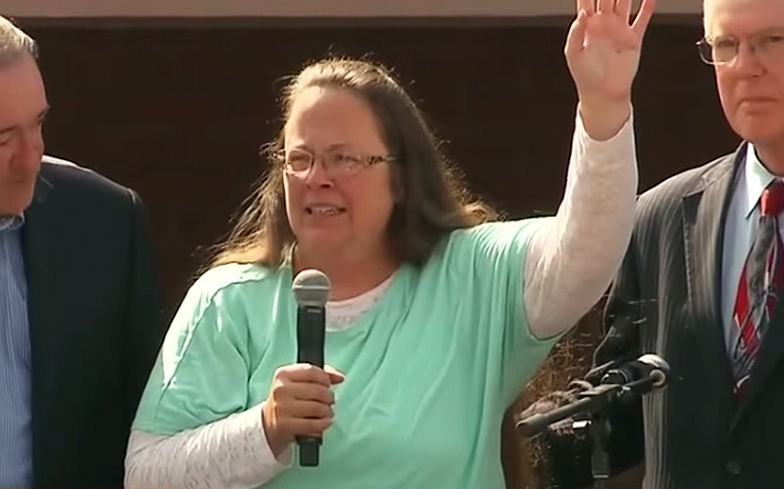
The Supreme Court of the United States has declined to hear and appeal from Kim Davis, who was jailed back in 2015 after refusing to issue marriage licenses to same-sex couples.
The clerk made headlines when she denied a federal court order to issue marriage licenses to same-sex couples following the Supreme Court’s decision to make equal marriage legal across all 50 states in the US.
However, LGBTQ+ campaigners were left alarmed and angry after two supreme court justices attacked the 2015 decision to legalise same-sex marriage.
Supreme court justices Clarence Thomas and Samuel Alito said that they agreed with the decision not to hear Kim Davis’ case for appeal, but added that it was a “stark reminder of the consequences” of the landmark decision five years ago.
The justices also claimed that Kim Davis “may have been one of the first victims of this court’s cavalier treatment of religion in its Obergefell decision”.
Thomas and Alito went further and added that the 2015 decision has left people with religious objections to same-sex marriage “in the lurch”.
“By choosing to privilege a novel constitutional right over the religious liberty interests explicitly protected in the First Amendment, and by doing so undemocratically, the court has created a problem that only it can fix,” they said. “Until then, Obergefell will continue to have ‘ruinous consequences for religious liberty.'”
This has naturally caused outrage amongst LGBTQ+ campaigners and activists, and is a stark reminder that we should not take these rights that have been hard fought for for granted.
“It is appalling that five years after the historic decision in Obergefell, two justices still consider same-sex couples less worthy of marriage than other couples,” James Esseks, director of the American Civil Liberties Union (ACLU) LGBT and HIV Project, told The Guardian.
“When you do a job on behalf of the government – as an employee or a contractor – there is no license to discriminate or turn people away because they do not meet religious criteria.
“We will fight against any attempts to open the door to legalized discrimination against LGBTQ people.”
Esseks reiterated that there’s no immediate threat of the 2015 decision being overturned, but this incident does serve to give us “a preview of what some justices’ views are”.
He added: “What I’m worried they’re going to say is ‘Well, fine, we’ll give you the marriage licence and you can call yourself married, but we’re not going to treat your marriage the same way we treat other people’s marriages’.
“The concern is that they’re going to use religious liberty as an excuse for licensing discrimination.”
LGBTQ+ activists also fear that following the death of Ruth Bader Ginsberg last month, this 2015 decision will be left more vulnerable than it has ever been over the past five years.
“The nightmare of a hostile supreme court majority is already here,” said Kevin Jennings, chief executive of the civil rights organisation Lambda Legal. “The confirmation hearings for Judge Amy Coney Barrett haven’t even started yet and Justices Thomas and Alito are already creating a laundry list of cases they want to overturn.”
The first openly-gay presidential candidate, Pete Buttigieg, who campaigned to become the Democratic nominee earlier this year, also tweeted: “So much for precedent and judicial restraint. Two justices now openly call for an end to marriage equality – knowing reinforcements are on the way. The stakes could not be higher.”
Earlier this year, the Trump administration tried to make it legal to refuse same-sex couples from adopting, with Department of Justice attorneys arguing that adoption agencies should be able to refuse to work with same-sex couples and anyone else they believe to be in violation of their ‘religious beliefs’.



